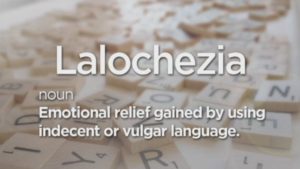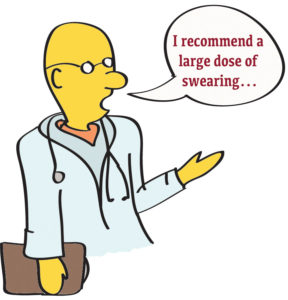“When angry, count to four. When very angry, swear.” Mark Twain.
One of the more interesting results of the recent “Brexit” referendum was the outpouring of savage yet creative insults hurled by Twitter users towards Donald Trump. It was encouraging to see such a dazzling display of wordplay and literary entrepreneurism. As a British expat, it was heartening to see that the ancient Anglo-Saxon talent for obscenity is far from a figment of our distant medieval past. Much to my (American) husband’s chagrin, I practice this noble art on a regular, if not daily, basis (my daughters have been told not to use “mommy words”) but I hope that, one day, they too will appreciate the satisfaction of a well-placed profanity.
In a 2012 Psychology Today article, Dr Neel Burton detailed 7 Good Reasons for Swearing. Among claims such as non-violent retribution, social bonding and self-expression, he explained that swearing can enhance pain relief and psychological health benefits. Apparently, a study at Keele University in England, found that casual swearers could hold their hand in ice-water twice as long as more decorous speakers. Serial swearers, apparently, become immune to the effects of profanity due to extreme repetition. This makes sense to me. If swearing was so effective at pain killing, I would not have needed an epidural during the extremis of childbirth.
Dr Burton also pointed out that swearing in a controlled, tempered manner releases endorphins and increases circulation, providing a sense of calm and control. I’m not sure about calm and control, but there is an immense satisfaction to be gained by emitting a vehement “Fuck!” at the appropriate moment. In addition, the good doctor also posited that some swear words are probably more effective than others in providing relief. I would have to agree. “Oh gosh darn it!” does not really have the same punch as “God Damn It!” or “Well bloody fucking hell!”
 Historically, swear words have changed to reflect the changing times. During the Middle Ages, religious terms were deemed “taboo” and to say “Damn” had a much more profound effect than today. Communal living and lack of basic hygiene facilities, ensured that the sight of a naked or partly naked human body was not unusual, as a result, words that referred to body parts were not seen as quite as profane as today. The works of Chaucer are filled with arcane obscenities reflecting their casual use. After the Renaissance and the religious upheaval of the Reformation, sexual terms gained potency and, especially in Britain, almost entirely eclipsed any references to God, Jesus and the saints except among the most devout couch-goers.
Historically, swear words have changed to reflect the changing times. During the Middle Ages, religious terms were deemed “taboo” and to say “Damn” had a much more profound effect than today. Communal living and lack of basic hygiene facilities, ensured that the sight of a naked or partly naked human body was not unusual, as a result, words that referred to body parts were not seen as quite as profane as today. The works of Chaucer are filled with arcane obscenities reflecting their casual use. After the Renaissance and the religious upheaval of the Reformation, sexual terms gained potency and, especially in Britain, almost entirely eclipsed any references to God, Jesus and the saints except among the most devout couch-goers.
One argument against obscenities is that using such words makes you sound un-educated. Personally, I object to this generalization. As any Brit will tell you, profanity is all about context, timing and emphasis. Research undertaken at my alma-mater the University of Lancaster (how apropos!), showed that though swearing reduces with increasing social class, the upper-middle class swear more than the lower-middle class. In 2014, researcher Timothy Jay found that “taboo word fluency and knowledge of slurs and general pejoratives” correlated with verbal fluency and was not a result of having a poor vocabulary. The creatively phrased anti-Trump insults of the Twitter-verse, mentioned earlier, certainly attest to imaginative word-play.
And so, gentle reader, for your own mental health, general well-being and society at large, I urge you to embrace your inner profane self. Next time you stub your toe, miss a deadline, or see Donald Trump’s ugly mug on your screens, let rip with a stream of words that would make a sailor blush!
You know that it makes fucking sense!






